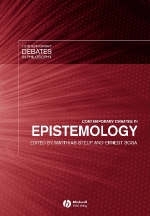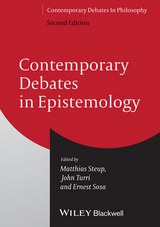
Contemporary Debates in Epistemology
Blackwell Publishing Ltd (Verlag)
978-1-4051-0739-6 (ISBN)
- Titel ist leider vergriffen;
keine Neuauflage - Artikel merken
Eleven pairs of newly commissioned essays face off on opposite sides of fundamental problems in current theories of knowledge. * Brings together fresh debates on eleven of the most controversial issues in epistemology. * Questions addressed include: Is knowledge contextual? Can skepticism be refuted? Can beliefs be justified through coherence alone? Is justified belief responsible belief? * Lively debate format sharply defines the issues, and paves the way for further discussion. * Will serve as an accessible introduction to the major topics in contemporary epistemology, whilst also capturing the imagination of professional philosophers.
Matthias Steup is Professor of Philosophy at St. Cloud State University in Minnesota. He is the author of An Introduction to Contemporary Epistemology (1996) and editor of Knowledge, Truth, and Duty: Essays on Epistemic Justification, Responsibility, and Virtue (2001). Ernest Sosa is Romeo Elton Professor of Natural Theology and Professor of Philosophy at Brown University as well as Visiting Distinguished Professor at Rutgers University. He is the co--author, with Lawrence BonJour, of Epistemic Justification: Internalism vs. Externalism, Foundations vs. Virtues (Blackwell, 2003). He replies to analysis of his work in Ernest Sosa and His Critics, edited by John Greco (Blackwell, 2004).
Notes on Contributors. Preface. Part I: Knowledge and Skepticism. Introduction, Matthias Steup (St. Cloud State University). 1. Is Knowledge Closed under Known Entailment?. The Case against Closure, Fred Dretske (Stanford University and the University of Wisconsin). The Case for Closure, John Hawthorne (Rutgers University). Reply to Hawthorne, Fred Dretske (Stanford University and the University of Wisconsin). 2. Is Knowledge Contextual?. Contextualism Contested, Earl Conee (University of Rochester). Contextualism Defended, Stewart Cohen (Arizona State University). Contextualism Contested Some More, Earl Conee (University of Rochester)Contextualism Defended Some More, Stewart Cohen (Arizona State University). 3. Can Skepticism Be Refuted?. The Refutation of Skepticism, Jonathan Vogel (Amherst College). The Challenge of Refuting Skepticism, Richard Fumerton (University of Iowa). 4. Is There A Priori Knowledge?. In Defense of the a Priori, Laurence BonJour (University of Washington). There Is no a Priori, Michael Devitt (City University of New York). Reply to Devitt, Laurence BonJour (University of Washington). Reply to BonJour, Michael Devitt (City University of New York). Last Rejoinder, Laurence BonJour (University of Washington). References. Part II: Foundational Knowledge. Introduction, Matthias Steup (St. Cloud State University). 5. Is Infinitism the Solution to the Regress Problem?. Infinitism Is the Solution to the Regress Problem, Peter Klein (Rutgers University)Infinitism Is not the Solution to the Regress Problem, Carl Ginet (Cornell University). Reply to Ginet, Peter Klein (Rutgers University). Reply to Klein, Carl Ginet (Cornell University). 6. Can Beliefs Be Justified through Coherence Alone?. Non--foundationalist Epistemology: Holism, Coherence, and Tenability, Catherine Z. Elgin (Harvard Graduate School of Education). Why Coherence Is not Enough: In Defense of Moderate Foundationalism, James van Cleve (Brown University). 7. Is There Immediate Justification?. There Is Immediate Justification, James Pryor (Princeton University). Doing Without Immediate Justification, Michael Williams (Johns Hopkins University). 8. Does Perceptual Experience Have Conceptual Content?. Perceptual Experience Has Conceptual Content, Bill Brewer (Oxford University)Perception and Conceptual Content, Alex Byrne (Massachusetts Institute of Technology). Part III: Justification. Introduction, Matthias Steup (St. Cloud State University). 9. Is Justification Internal?. Justification Is not Internal, John Greco (Fordham University). Justification Is Internal, Richard Feldman (University of Rochester). 10. Is Truth the Primary Epistemic Goal?. Truth Is not the Primary Epistemic Goal, Jonathan Kvanvig (University of Missouri). Truth as the Primary Epistemic Goal: A Working Hypothesis, Marian David (University of Notre Dame). 11. Is Justified Belief Responsible Belief?. Justified Belief as Responsible Belief, Richard Foley (New York University). Obligation, Entitlement, and Rationality, Nicholas Wolterstorff (Yale University)Response to Wolterstorff, Richard Foley (New York University). Response to Foley, Nicholas Wolterstorff (Yale University). Index
| Erscheint lt. Verlag | 10.12.2004 |
|---|---|
| Reihe/Serie | Contemporary Debates in Philosophy |
| Zusatzinfo | 5 |
| Verlagsort | Oxford |
| Sprache | englisch |
| Maße | 173 x 246 mm |
| Gewicht | 638 g |
| Themenwelt | Geisteswissenschaften ► Philosophie ► Erkenntnistheorie / Wissenschaftstheorie |
| ISBN-10 | 1-4051-0739-1 / 1405107391 |
| ISBN-13 | 978-1-4051-0739-6 / 9781405107396 |
| Zustand | Neuware |
| Informationen gemäß Produktsicherheitsverordnung (GPSR) | |
| Haben Sie eine Frage zum Produkt? |
aus dem Bereich


![Was heißt Denken?. Vorlesung Wintersemester 1951/52. [Was bedeutet das alles?] - Martin Heidegger](/media/113619842)
